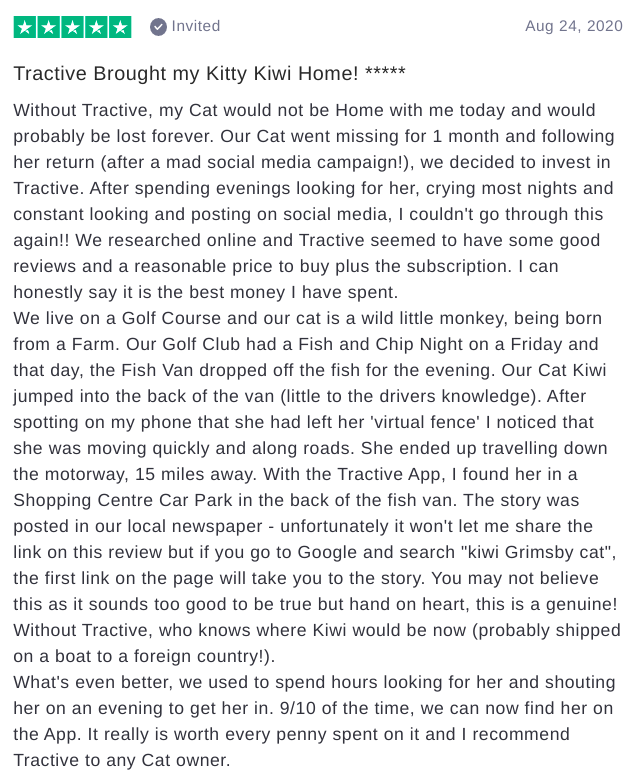how to find a lost indoor cat
How to find a lost cat? What to do in a missing cat scenario? First off, take a deep breath, and try to stay calm. Then, take a look at our guide, which is full of tips and helpful information that can help you bring your cat home. And get a GPS cat tracker so you always know where they are, and prevent your cat from going missing again.
What we cover in this guide:
- Why do cats run away?
- How long does it take for a lost cat to come home?
- What are the chances of finding a lost cat?
- How to find a lost cat with a microchip
- Cat hiding inside the house
- Cat hiding outside, close to home
- How to find a lost indoor cat
- Conducting a physical search for your lost cat
- Finding a lost cat with a Tractive GPS cat tracker
- Luring out a lost cat
- How do I attract a lost cat?
- Making lost cat posters and social media posts
- Contacting local vets and shelters
- Asking local animals
- Will my other cat look for my missing cat?
- More tips on how to find a lost cat
- How to prevent a cat from running away
Why do cats run away?
Whether they are indoor or outdoor cats, our feline companions sometimes stray. There are many reasons why cats run away, but here are some common ones:
- A female cat in heat or an unneutered male cat have a strong mating drive, which may cause them to roam in search of love
- Cats are curious beings who love to hunt and explore their territory
- Of course, it could just be that there's a friendly neighbor feeding them
Discover more reasons why cats run away.
Whatever the reason, it's quite common for cats to run away. So if you find yourself wondering where your missing cat is, you are not alone!
How long does it take for a lost cat to come home?
Most cats won't stay missing for very long. Even if they stay out longer than usual from time to time, they'll generally come home when they're hungry and remember you're their meal ticket. And reassuringly, cats have a great sense of direction.
However, if your cat is gone for more than 12 hours or overnight, it's time to take action.
If that's the case, don't panic. Simply follow the tips in this article to bring your cat home safely.
What are the chances of finding a lost cat?
"If my cat has gone missing, will they come back?" This is a question nearly all parents of lost cats want to know. So, we turned to science to help us find an answer – what are the chances of finding a lost cat?
A 2018 study from Animals gathered data on search methods used to find missing cats, which ones were most successful, and where the lost cats were found. According to the study:
- 61% of lost cats were found within one year
- 34% of lost cats were found (alive, thank goodness) within 7 days
- after 90 days, lost cats were less likely to be found alive 😿
More from their research:
- A physical search increased the likelihood of finding a missing cat
- 75% of cats were found within 500 meters of where they escaped
💡 Tip: The faster you can get outside and go search for your missing cat, the higher your chances of finding them.
How to find a lost cat with a microchip
Many people assume that a cat microchip will help them locate their cat immediately if they go missing. Unfortunately, this is not the case.
Unlike a microchip, a GPS cat tracker helps you find your lost cat in minutes by letting you follow their location in real-time.
To find a lost cat with a microchip, you'll need to wait until someone finds your cat and brings them in to a shelter or vet where the microchip ID can be read.
If your contact details on the microchip ID are up to date, and if you're lucky enough to get a call about your missing cat, you'll be reunited.
You can use the AAHA Universal Pet Microchip Lookup or the US Pet Chip Registry to learn more about microchip registry and missing pet identification.
While a microchip is a security must-have, it does not actively help you search for a lost cat or guarantee that they will be returned to you.
It could well be that your lost cat is actually hiding inside the house. Cats hide indoors for a number of reasons:
- They want to feel safe and cozy: maybe they found a comfortable box in the bottom of your closet and decided to take a nap
- They're scared or anxious: for example, if a two-legged or four-legged "stranger" is over for a visit at your place
- They're sick or pregnant: cats often go into hiding when they are feeling unwell, or are about to give birth
So do thorough check indoors, and ask other members of the household to help.
If you have a Tractive GPS cat tracker, use Find Mode – which pops up on the Tractive GPS app screen when your cat's tracker is nearby – to locate a hiding cat indoors.
Cat Trackers – Shop Now
According to pet detective and lost cat expert Kat Albrecht, missing cats tend to hide, in silence, typically staying close to home 1. Lost dogs, on the other hand, tend to run and travel great distances quickly.
That means your lost feline friend is probably closer than you think. They might have gone into hiding, outside and close to home, for any of the reasons above. Or they might have gotten stuck, lost or frightened while chasing butterflies.
After searching in the house, do a thorough check of your property or your immediate surroundings. Check places they could be stuck or hiding, including:
- under the deck or porch
- on the roof
- in the garage
- up a tree
- inside the car
- in a chimney
- around the trash and recycling bins
Especially if your cat is an indoor cat, you're likely going to find them near home.
How to find a lost indoor cat
Having an indoor cat go missing can be especially heartbreaking, because we aren't used to them wandering far from our feet! 😿 So, how does one find a lost indoor cat?
The first step is understanding that cats are territorial creatures, and that they often don't leave their territory on purpose.
Indoor cats usually have a much smaller territory than outdoor cats. This means they only feel comfortable exploring their "home territory", so they probably won't travel much further than a small distance from where they live.
In fact, a 2017 study found that missing indoor cats were found, on average, a distance of only 39 meters (128 feet) away from home.
Outdoor cats, on the other hand, are known to travel farther. They were found an average distance of 300 meters – or three football fields – away.
But now, back to indoor cats. Start searching your immediate surroundings in order to find a lost indoor cat. Call their name, put out some cat food, and check any potential hiding spots like in the garage or up a tree – and your feline friend will likely be back in your arms in no time.

Conducting a physical search for your lost cat
If your cat is missing and nowhere to be found inside or near your home, it's key to start an active, physical search for them. In other words, don't just wait for your cat to return home on their own.
A study by pet detective Kat Albrecht and professor Jacquie Rand found that 59% of lost cats were found alive precisely because their humans actively searched for them 2.
Here are some tips for your search:
- Start searching right away. The sooner you start looking for your lost cat, the easier it will be to find them.
- Start at home and work outwards. Remember, 75% of cats were found within 500 meters of where they call home.
- Make a list of reasons why your cat could be lost. Then, you'll know where to start your search.
- Call for your cat by name. Researchers found that cats can recognize their human's voice as well as their own name, even when strangers call it3.
- Ask friends and neighbors to help you actively search. If they can't, ask them to call or text you if they see your cat.
- Check your cat's old territory. If you moved recently, your cat may have tried to return to their old home.
- Consider your cat's personality. Are they more likely to be hiding, or exploring the neighbor's farm? This story shows how one Tractive user discovered their curious cat Kiwi trapped inside a moving van!
Finding a lost cat with a Tractive GPS cat tracker
If your lost cat is wearing a Tractive GPS cat tracker, you're in luck! This will make your search for your missing cat much easier. Here's how one cat mama brought her beloved Kiwi home with the help of Tractive GPS:
Tractive Brought my Kitty Kiwi Home! Without Tractive, my Cat would not be Home with me today and would probably be lost forever. Our Cat went missing for 1 month and following her return (after a mad social media campaign!), we decided to invest in Tractive. After spending evenings looking for her, crying most nights and constant looking and posting on social media, I couldn't go through this again!! We researched online and Tractive seemed to have some good reviews and a reasonable price to buy plus the subscription. I can honestly say it is the best money I have spent.
We live on a Golf Course and our cat is a wild little monkey, being born from a Farm. Our Golf Club had a Fish and Chip Night on a Friday and that day, the Fish Van dropped off the fish for the evening. Our Cat Kiwi jumped into the back of the van (little to the drivers knowledge). After spotting on my phone that she had left her 'virtual fence' I noticed that she was moving quickly and along roads. She ended up travelling down the motorway, 15 miles away. With the Tractive App, I found her in a Shopping Centre Car Park in the back of the fish van. The story was posted in our local newspaper – unfortunately it won't let me share the link on this review but if you go to Google and search "kiwi Grimsby cat", the first link on the page will take you to the story. You may not believe this as it sounds too good to be true but hand on heart, this is a genuine! Without Tractive, who knows where Kiwi would be now (probably shipped on a boat to a foreign country!).
What's even better, we used to spend hours looking for her and shouting her on an evening to get her in. 9/10 of the time, we can now find her on the App. It really is worth every penny spent on it and I recommend Tractive to any Cat owner.

If you have a Tractive GPS on your missing cat, here's all the tools at your disposal to help you find your lost cat fast:
- Hit LIVE to follow every step in the Tractive GPS mobile or web app with real-time location updates every 2-3 seconds
- Track together with friends and family using Family Sharing
- Use Find Mode once you're nearby to pinpoint their location – they might be hidden behind or under something
- Activate light or sound if it's dark out, or hard to see where they are
- Share current location with the public if your cat is further away, and you need help getting reunited – you can do this in the location section under the Tracker tab in your profile
- Reunite with yout cat, and give them a biiig cuddle
Ready, set, track!
Luring out a lost cat
If you haven't been able to find your cat so far, the next thing you can try is luring out your lost cat with treats.

Put a bowl of your cat's favorite treats or food outside your doorstep. You could even put food in additional spots around your home if you have a large outdoor space. Your cat might catch the smell and run home for a tasty snack. Make sure someone is there to spot your cat in case they come home for a bite to eat.
This can help lure your missing cat home. However, be aware of raccoons (and other wildlife) it may also attract!
How do I attract a lost cat?
Here are some more ideas to attract a lost cat back home:
- Leave the garage, or another door cracked open – cats like to sneak inside
- Put your cat's favorite bed, blanket or scratcher outside – the scent will attract them
- Put some special food out, like tuna or sardines. The smellier the better! Just make sure it's salt and oil free. Heat up the food to increase the aroma
- Go outside, and talk in your normal voice, as if you're chatting on the phone – cats are known to be attracted to their human's voice
- Keep an eye out: cat parents have reported their cats returning most often between the hours of 8pm-2am and 4am-7am4
Making lost cat posters and social media posts
Still no luck finding your cat after your search? It might be time to put up missing cat posters. An effective lost cat sign should include:
- a high-resolution photo of your cat
- a physical description including age, sex, coat length and color, and any other special markers (like a unique fur pattern, or a colorful collar) that could be used to identify your cat
- when and where your cat was last seen
- your name and phone number
When putting up the cat posters, remember: cats go farther than we sometimes think. Hang posters at public transport stops to make sure as many people see your poster as possible. Cover the posters in plastic or tape for durability.
Download the free Lost Pet Poster template from Tractive
In addition, you'll want to post your cat's picture and description on various social networks. And ask your friends to keep an eye out. On most social media platforms, there are specific groups or lists for lost & found animals in specific regions. Check the pages of animal shelters in your area; they'll often post their latest finds online.
Perhaps your cat has already been found and brought into a vet or shelter. Call local vets and animal shelters to ask if anyone has brought in a cat matching your cat's description. Leave them your number, so that they can call you in case your cat is eventually brought in.
Also check shelter websites – people often post missing cats they've found here.
You might find these regional resources useful in your search to being reunited with your lost cat:
- Found Cats Database USA
- Missing Animal Response Network – Lost Pet Recovery Training by Kat Albrecht
- Animal Search UK
- PetRescuers app for iOS or Android – a mobile app devoted to helping pet parents reunite with their lost pets.
GPS Cat Trackers
Asking local animals
If you want to find a lost cat, here's an unusual tip from some fellow cat lovers in Japan. If you see other cats in your neighborhood, talk to them! That's right – enlist the help of other felines in the effort to bring your cat home. According to an article on Japan Today, some lost cat parents have had success by doing the following:
When you see other cats in your neighborhood, approach them kindly. Tell them, if they happen to see your cat, to tell your cat to come home.
It might sound strange, but if it can help you find a lost cat – why not give it a try?
Will my other cat look for my missing cat?
Some people wonder if their other cats will look for and maybe help them find the missing cat in their family. Eva Morchairs shared a success story like this on Quora:
Tofu (the cat) didn't come home after being let outside to play. I stayed up all night worrying about her. Come morning, still no sign of her. I had another cat, Fifi, that wanted to go outside and play. Before I let her go outside I picked her up and held her face up to mine and made eye contact with her and asked her to go and find Tofu. I told her to go find her and bring her home. I gave her a small kiss on the nose and I opened the back door for her and let her go play. About twenty minutes later my mom called out to me – Fifi and Tofu were both sitting on the steps outside my back door.
So, it seems like it's worth a shot. You could try asking your other cats to help you find the missing one. But of course, this may not work, as the companion cats may not be willing to explore unfamiliar places in search of the lost one, in favor of their familiar territory.
More tips on how to find a lost cat
If your cat is missing, it's understandable that you may be anxious, and searching the web for the best way to bring your cat home. No one likes the feeling of not knowing where their fuball is! But hopefully, with all these tips, you'll be together again in no time.
To finish, we thought we'd share some extra quick tips on how to find a lost cat:
- Look when it's dark and quiet outside
- Don't bring other animals with you when you're on your search – they may scare your cat away
- Use a flashlight to search in the dark
- Bring your cat's favorite toy and treats
- Continue calmly calling their name
- Walk slowly and take frequent breaks from calling out, so that your cat has a chance to call back
- Scan the surrounding area for movement or sounds.
- Check places where your cat could get stuck
- Set up a humane baited trap (available at a feed or hardware store). You can place some kitty litter and towels with your scent on them to lure your lost cat in
- Hire a lost cat finder or pet detective
- Offer a reward to anyone who can find your cat
- Install motion sensor cameras or baby monitors around your house.
- Search places where a lost cat could find warmth
- Ask anyone who visited your property (such as a delivery person) to check their van or truck
- Leave a piece of clothing or towel that smells like you outside your door
- Sprinkle flour around and check for paw prints, if you suspect your cat is hanging around but not coming home
- Publish a missing cat notice in the local newspaper
Finally, our last tip for finding a lost cat: Don't give up!
If your cat is scared, they may not come out of their hiding place easily. So have patience – and faith that your cat will return.
How to prevent a cat from running away

Hopefully, you've found your cat with the help of these tips. Now, what can you do to prevent your cat from running away and going missing again?
Here's how to avoid another nightmare:
- Keep an eye on your cat in real-time with a GPS cat tracker – you can also set safe spaces so you get alerts if they leave their usual territory.
- Create a cat enclosure.
- Do anything you can to keep your cat happy and occupied at home.
- Spay or neuter your cats, to prevent them from running away due to their strong mating instinct.
Remember, should your cat go missing, the most important thing is to not give up. Finding a lost cat might feel challenging, but chances are, you will be reunited in no time.
The good news is that studies have shown that about 74% of lost cats are eventually united with their family again 5. So try to stay calm and hopeful until your feline friends is in your arms again.
For more tips and info on how to find a lost cat and prevent them from going missing, check out the video below:
Did you find this blog post helpful? Then share it with a friend!
Discover Cat Trackers
how to find a lost indoor cat
Source: https://tractive.com/blog/en/safety/missing-cat-what-to-do
Posted by: bonillaprispither1988.blogspot.com

0 Response to "how to find a lost indoor cat"
Post a Comment